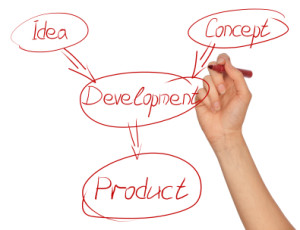Research and development work is unique in for-profit businesses as it puts immediate profits aside and focuses on ensuring future profits. Many believe that it is risky to invest in an R&D company because of the amount of money that is spent on trying to form new products and ideas compared to the amount that is earned on existing products.
Sometimes R&D companies simply don’t succeed in making any kind of breakthrough that leads to a truly profitable idea. This approach positions a possible future against the real present. R&D in this approach will always be compromised as the present reality creates biases in the minds of business people.
In contrast TBS has a unique approach towards R&D, through our following five principles: ’Immediacy’, ‘Relevancy’, ‘Inclusiveness’, ‘Integration’, and ‘Smart Growth’.

IMMEDIACY:
The point of difference for TBS, as an R&D firm, is the notion of novelty. Although like others we invest in new ideas, in creating these ideas in the Western Modern context, a distance is created with people’s past and with their present uses, needs and experience, whether in architecture, technology or any other domain of creativity. The desire to do something that no one has seen or heard prevails.
The only thing desired of the present is commercial benefits. That is, the desire for a novel product to be immediately acceptable among the populace, and thus be a source of wealth and recognition for the creator immediately. For TBS, it is extremely important that our research and development are grounded in needs that are presently realized. Although we don’t prefer the present over the future, we do believe that utopia can never be a possible future unless it can be traced back to the present.
RELEVANCY:

TBS’s notion of creativity arises from within specific disciplinary contexts, identifying what is relevant to the core functionality and purpose. It is this principle of TBS that removes what is not, or can ever be, essential for an industry in general and its disciplines in particular.
,p>TBS believes that it is knowledge and knowledge based practices that can dynamically suggest such relevancy. But the methods of engagement of knowledge practices will not be replaced with Stakeholder engagement, which is more political positioning of knowledge, either individually by some politicized person or by a cumulative assumption of a whole as democracy. This is the major problem with contemporary enterprises of entrepreneurship.
They suggest that the users know what is relevant to them, which is true if seen individually but for what is relevant to the users collectively, in each discipline and across the disciplines in an industry, Stakeholder engagement cannot lead disciplinary relevancy. The same critique is valid to democracy itself in a social arena. In TBS’s approach to R&D, it is knowledge that primarily conditions relevancy.
INCLUSIVENESS:
There are multiple disciplines in each industry that need to be considered and included in an integrated fashion to construct the industry for tomorrow. Everyone is so busy doing their jobs that no one works strategically to remove redundancies and add what is important. Is there someone thinking about adding roles and changing roles? Does academia provide such inclusiveness? Not really.
Inclusiveness in TBS means problems are to be analyzed from and solutions are to be tested by all genres of the target industries. Inclusiveness does not mean that in these TBS principles, all parties together can assume to be the whole of the industry.
INTEGRATION:
Inclusiveness of disciplines cannot assure their integration. Integration is auto-didactic as a TBS principle. This integration has to be smart and swift and thus technologically sound. This R&D approach stands against those solution providers who are primarily looking at their respective industries and providing technological solutions mimicking either paper based practices in pieces or mimicking patchy document making software that replaced paper.
There are few solutions which try to surpass the limits of paper based solutions with more integrated pieces. However if these are not knowledge based then they won’t earn TBS’s support as they would fail to lead the industry.
GROWTH:
Being technologically sound does not guarantee improvement with time and with diversified use. It has to be auto-reconstructive. A business model needs to be engineered that can integrate appropriate disciplines in a self-propelling growth with the aid of appropriate technology.
The Smart Growth principles of TBS stand opposite to current narcissistic practices of technology, showing “See what I can do?” and only afterwards trying to find the niche for its use in a target industry.

